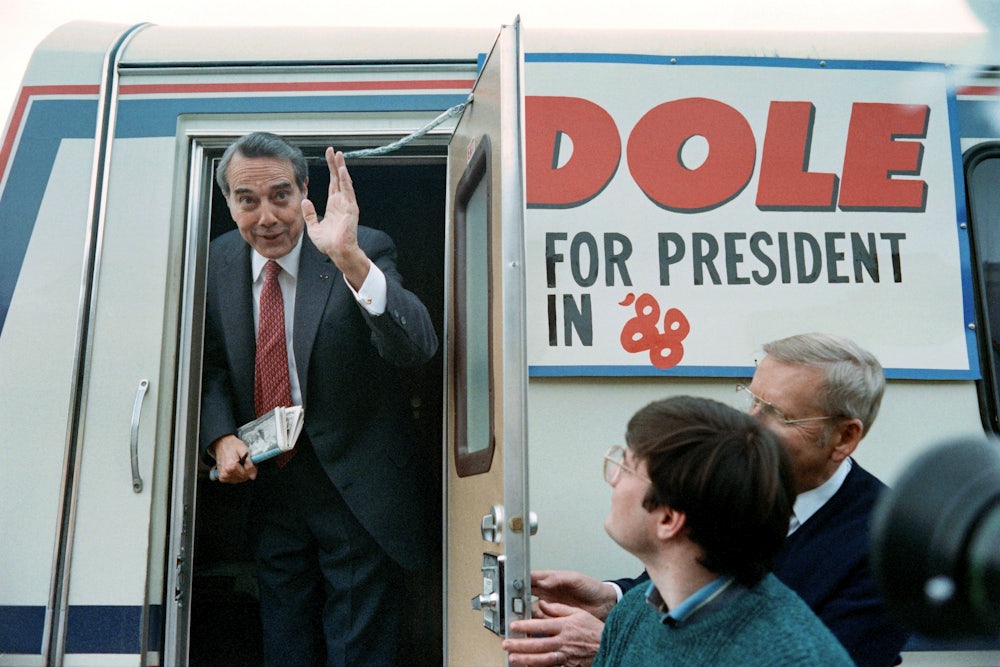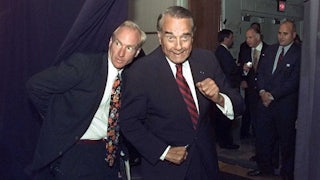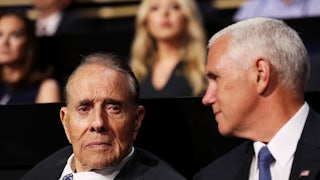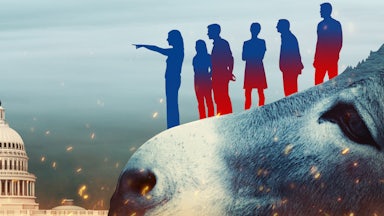Nashua, New Hampshire
In the theater of American politics In 1988 Bob Dole is the mask of comedy and tragedy. A doubleness runs through him and all his works, and it begins with his body. From the back of a big hall Dole’s injury is unobtrusive. One’s attention is captured instead by his tall silhouette, pivoting from side to side, and by his flat, cutting voice. In television interviews one most often sees only a sharp-featured face atop broad shoulders. But up close and in person, without a mediating camera to choose what shall be seen and not seen, one can contemplate at leisure the wound, still raw after 43 years, that has marked him in body and spirit. Dole’s left side is buoyant and energetic. His left arm is in constant motion, arcing and slicing with hand flat, pumping and punching with fist clenched. His right side, as if in silent reproach to all that hopeful animation, is still and crabbed. The right arm is crooked at waist level and noticeably shorter than the left, the right hand smaller, darker, wrinkled, and always twisted around the ever-present pen he clutches to warn off any unwelcome touch.
With Dole, metaphors of duality are inescapable. His physical doubleness is more than matched by doubleness of heart and mind. But Dole’s is not the serene dualism of a harmonic yin and yang; it is more like the positive and negative poles of some infernal electric machine, and part of what makes him so obsessively interesting to watch is that one never knows when the spark will snap and crackle, leaving behind a strong whiff of ozone. The spark may take the form of acrimony or of humor; the shock may be painful or it may be pleasant, but it is always there. The tension in Dole is not between anything so banal as unhappiness and happiness. Rather it is between an almost unfathomable bitterness, on (literally) the one hand, and a kind of rough wisdom touched by compassion, on the other.
On New Hampshire primary night Dole showed the grimacing half of his mask. In Iowa he had come from behind to beat George Bush (with some help from Pat Robertson). Here in New Hampshire the polls had shown him going from a 2 to 1 deficit against Bush two weeks before the voting to dead even two days before. But in “the only poll that counts” he got 42,878 votes, or 29 percent, against Bush’s 56,393, or 38 percent. Appearing before his supporters at the Merrimack Hilton, Dole introduced a kid who had stood for him in a fourth-grade mock election, and then added bleakly: “The only difference is, he won.” But the real shocker came later, when Tom Brokaw brought the two front-runners together electronically. Bush in NBC’s Manchester studio and Dole on a monitor, and asked Dole if he had any message for the vice president. Dole’s answer was a five-word snarl: “Stop lying about my record.”
The Republican result here was a disappointment to the traveling press corps, which had collectively settled upon a story line for New Hampshire to which only a Dole triumph over Bush could have provided a satisfying climax. The story line was the humiliation of Bush-the-wimp, and the press pursued it with gusto. The vice president provided plenty of help. He engaged in wan regular-guy gestures, such as steering an 18-wheeler slowly around a truck-stop parking lot (with Secret Service men perched on the running board). He made a pathetic plea for votes, at the end of Saturday evening’s televised debate, on grounds of his inability to express himself (“1 don’t talk much, but I do believe. 1 may not articulate much, but I feel”). And he repeatedly made a faintly off-color defense of the environmental benefits of the Alaska pipeline (“There are more darn caribou rubbing up against that pipeline and having babies”).
By contrast. Dole got a mostly free ride. But if the story line of the moment had been something less favorable to him, then the press’s obvious liking for Dole would have given him less protection. Consider his behavior at a Friday appearance at the University of New Hampshire. During the question period, a neatly dressed young man stepped to the microphone and began, “I’d like to ask a question about South Africa, which hasn’t been a forefront issue in this campaign but will definitely be a problem for the next president—” “Aren’t there any conservative students here?” Dole interrupted. “Gotta be one or two. Good to see you,” he added as a few students waved. The audience laughed. “Senator Dole—” the questioner continued, but Dole interrupted again: “I’d like to see some future taxpayers.” That cut the laughter short, and it turned to boos. If the press’s story line that week had been different—if it had been, say, the comeuppance of Dole-the-meanie— that little tiff might have made the news as the day’s sound bite, perhaps accompanied by a pointed reminder of Spiro Agnew’s attacks on “campus bums.”
Like a puff adder, Dole emits jets of venom when poked. Yet he is enormously seductive, not only to reporters but also to a great many Democrats. I have heard more Democrats than I can count say that Dole is the only Republican who might tempt them to stray, especially if their own party nominates someone they dislike or are indifferent to. Some say they like Dole because he is funny, others because he is cynical, others because he is a practical man impatient with ideology. Yet this uncanny appeal of Dole’s surely goes deeper than these pat formulae suggest, and it is somehow rooted in the complicated layerings of doubleness in the man.
Start with his humor. Nothing quite like it, so far as I know, has ever been seen before in American politics. It is not of the folksy, reassuring, yarn-spinning, countrified variety, nor is it the urbane wit of the cosmopolitan sophisticate; and it has nothing whatever to do with the packaged, professionally supplied jokes on which other candidates rely. Dole’s humor is bleak, savage, often deeply subversive. It has less in common with Lincoln’s or Will Rogers’s or Adlai Stevenson’s than with Lenny Bruce’s.
Dole knows essentially nothing about popular culture. He cannot remember the last movie he saw. He reads newsmagazines for relaxation. It happens that the most energetic part of American popular culture right now is comedy. Bob Dole has probably never heard of Andy Kaufman or David Letterman, yet his humor shows every sign of coming out of a similarly modernist, minimalist, almost dadaist, sensibility. God only knows how this happened, but there it is.
An example. In Iowa Dole said that when President Reagan needed something done he called Dole, not Bush. Bush shot back that when Reagan wanted someone to take his place should something happen he called Bush, not Dole, Apprised of this sally. Dole asked, “Did he call collect?”
Another example. In the Iowa debate sponsored by the Des Moines Register, Jack Kemp asked Dole why he’s for an oil import fee. Dole answered seriously, explaining that he hadn’t been an advocate of such a fee but would support it under certain conditions, as a means to price stability and energy independence, and that a five-dollar-per-barrel fee, for example, would raise about five billion dollars. Then he added, totally deadpan: “You’d have to rebate probably most of that to those who use heating oil in New England, particularly in those early states like New Hampshire.”
One more. Last week, at the Peterborough Town Hall in New Hampshire, he told how he had challenged the local Republican chairman to “give me one good reason” Dole should join his party. “ ‘I’ll give you the best reason I know of,’ “ came the reply. “ There are twice as many Republicans in this county as Democrats.’ So I made a great philosophical judgment right there on the spot.”
All this is pure Dole: laconic, acerbic, dry as a bleached skull on a Kansas plain. The “call collect” line skewers Reagan as doddering and out of it, ridicules Bush as choking on a silver spoon, and throws in a bit of dada blindsiding for good measure. The “early states” line sounds cynical, but since the effect is to sandblast away the cant in an otherwise conscientious answer, the result is actually less cynicism, not more. On the surface the line is “self-deprecating” (that holy grail of political joke writers), but it is at least equally aimed at his opponents, who. Dole subtly suggests, offer the cant without the antidote. (Dole’s humor is never without political purpose.) Moreover, the line is subversive to the whole enterprise in which they all are engaged; Dole aims his shafts at the grotesqueries of politics, just as Letterman aims his at television’s. The “philosophical judgment” line is similarly subversive. Dole’s jokes and comic asides are part of his doubleness, a continuous running commentary on himself, his rivals, his trade, and whatever the ostensible subject of his remarks happens to be.
The “philosophical judgment” line begins to get at one of the reasons so many Democrats like Dole: they suspect he doesn’t believe a lot of what he says. (Unfortunately for Dole in New Hampshire, there are apparently conservative Republicans who share that suspicion.) This does not come across only in his humor. He often sends double messages. Certainly he did so in a foreign policy speech to the New Hampshire legislature a week before the primary. It was studded with right-wing crowd-pleasers such as calling Russia a godless Communist state and quoting Jeane Kirkpatrick on those who always blame America first.
And on the red-meat issue of aid to the contras Dole made all the right noises, blasting “liberal Democrats” for “throwing in the towel on freedom” and showing “naive faith in a Marxist dictator like Daniel Ortega.” But he was careful to define the threat not as “Daniel Ortega’s army” but rather as “Soviet bases and intelligence facilities and advisers.” I heard him go further over the next few days. At the University of New Hampshire he excoriated the Sandinistas and then said, “I would question that form of government. Does that give me the right to say we’re gonna topple it? No. But if there’s some legitimate group that’s fighting for their freedom I might want to get Congress to go along with offering assistance.” At the Derryfield School he said, “We’re not afraid of Ortega. We’re not afraid of the Sandinista army. They’re no threat to us. But now they’re talking about increasing the army and bringing in sophisticated Soviet weapons. If we ask the American people, ‘Do you want another Soviet base in this hemisphere?,’ they’d say no. We haven’t articulated our policy very well.”
One can discern in all this the outlines of support for a deal whereby the Soviets would forgo bases and withdraw advisers in exchange for an end to U.S. support for the contras—exactly the deal Gorbachev has reportedly been offering, and the administration rejecting, for months. I like to think that Dole is simply too intelligent and too realistic to think much of the current policy of keeping a nasty, inconclusive war going and hoping for the best. He offers rhetorical red meat to the faithful, but for a true Doleologist like me his real intentions are there to see, cryptic but decipherable. To me this looks like ruthless shrewdness in the service of ultimately reasonable policy. To someone else, of course, it might look like duplicity.
Dole misses no chance to refer to himself as a conservative, and his conservative credentials date back a long way. Like Reagan, he was a charter supporter of Barry Goldwater in 1964. He was always a slashing partisan, and he is one of the few prominent Republicans who still uses “Democrat” as an adjective. But ideology is foreign to him, and to the extent that partisan loyalties have given way to ideological ones. Dole is a far less divisive figure than he used to be. When he touts his leadership abilities, he mentions two examples: working with Patrick Moynihan and Tip O’Neill to rescue Social Security in 1981, and defying the Reagan Justice Department to get the Voting Rights Act renewed in 1982. His record, on the whole, remains that of a hidebound Reaganite. But judging from what he says, and the feeling with which he says it, that is not the side of himself he values.
Dole is never more laconic than when he talks about the wound that felled him in the Po Valley in 1945, paralyzed him from the neck down for a year, put him in the hospital for 39 months, and left him reluctant to this day to look in the mirror. He does not speak of himself as a hero and in fact (unlike Bush) he was not a hero, merely a kid who “got shot.” The experience made him, he says, “a bitter young man.” Of course, he always adds, it also made him more sensitive to the handicapped and to unfortunates in general. Still, it is remarkable in this age of empty optimism that he dares to use a word like bitter about himself, even in the past tense. At some level he remains bitter, and his defeat here will do nothing to gentle him. The Republican contest is about to get ugly; the temptation to go hard right will be strong. It will be interesting to see if Bob Dole can resist it, and still be president.






